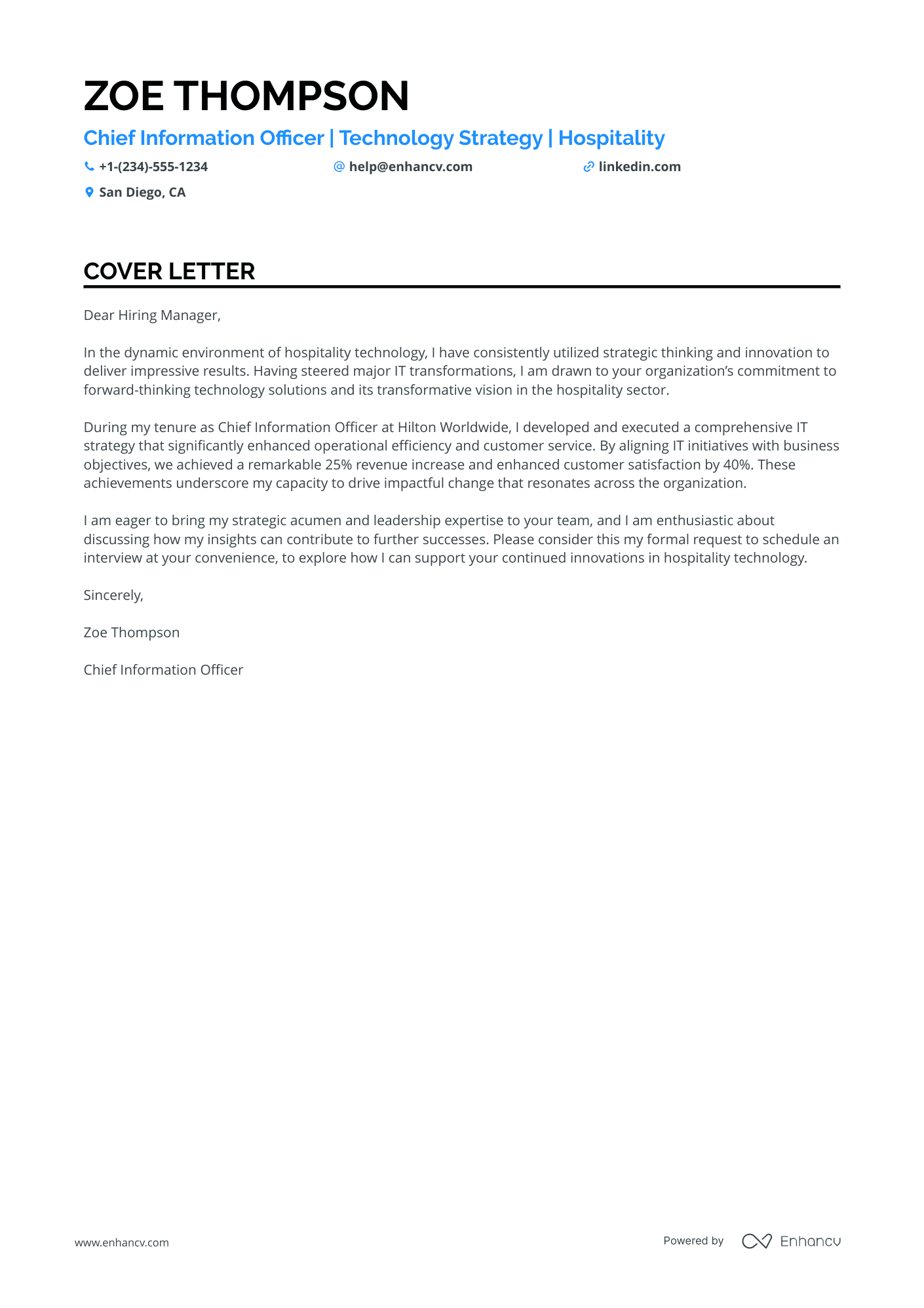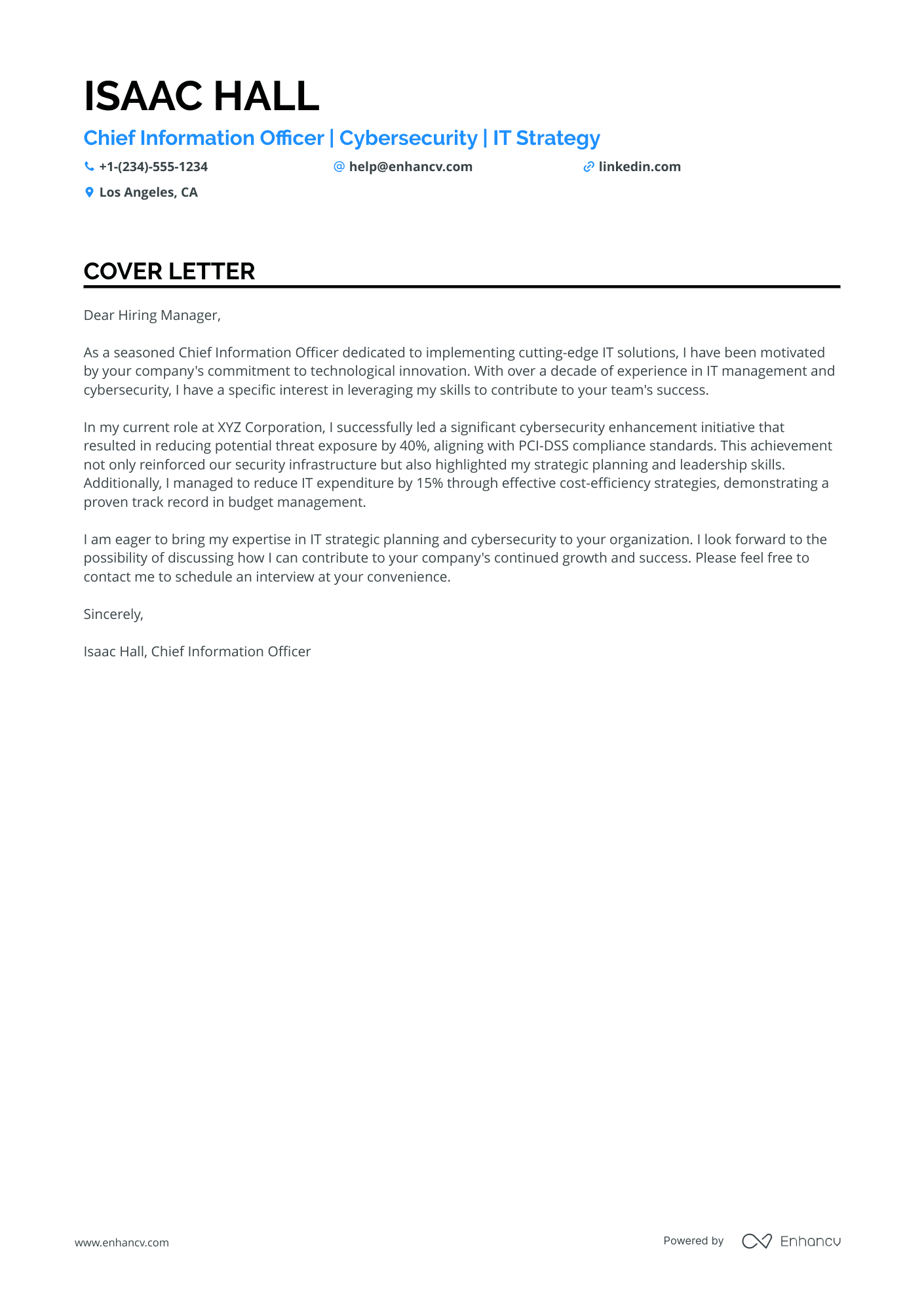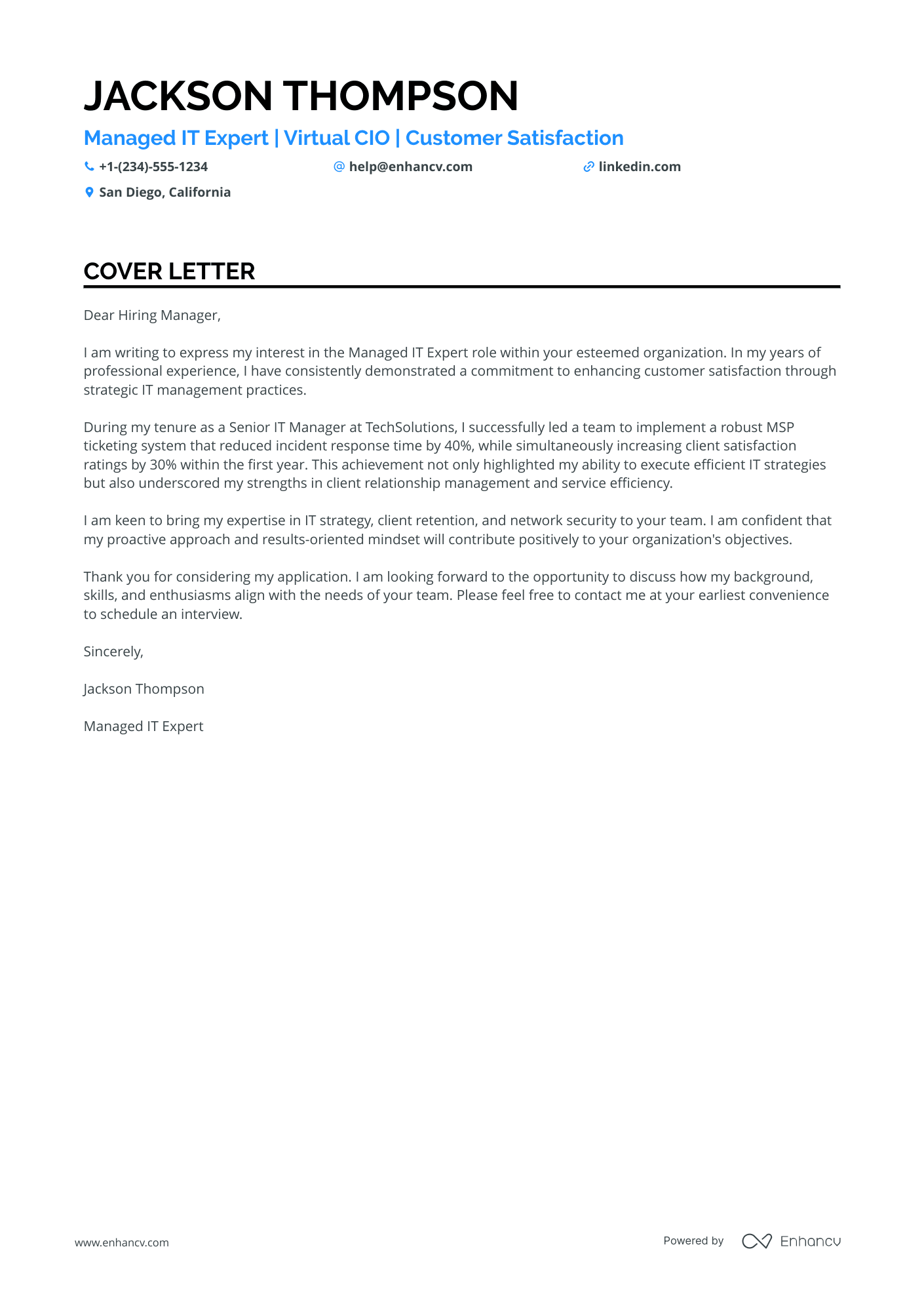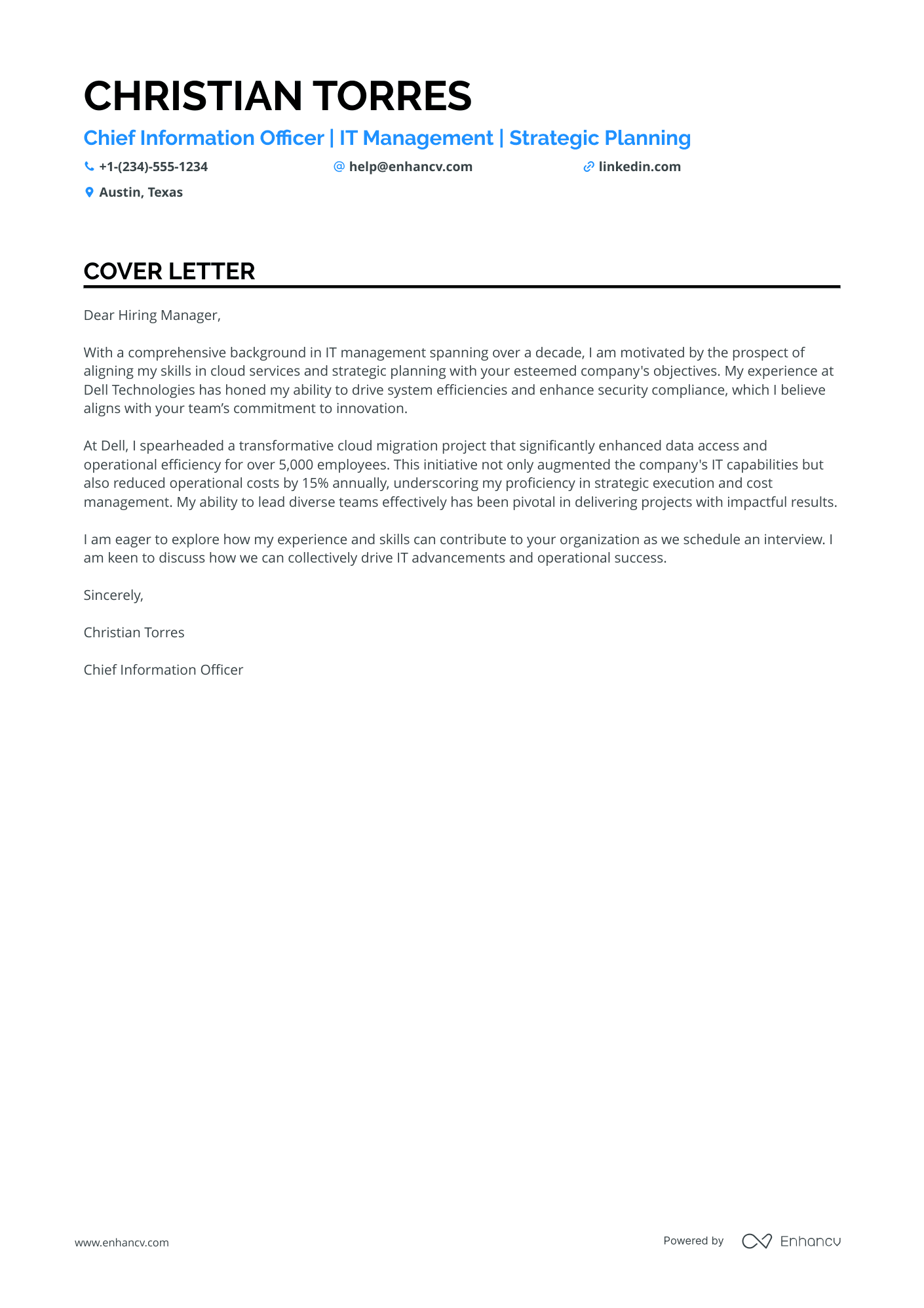Embarking on the job hunt, you've likely stumbled upon the need for a standout CIO cover letter. This isn't just an echo of your resume; it's the canvas for your proudest professional triumph, woven into a narrative that captures your skill. Wield formality without falling into cliché territory, and keep your storytelling potent yet concise—ideally, a single page. Let's navigate these common hurdles together and craft a cover letter that opens doors.
- Personalize your cio cover letter and get inspired by other professionals to tell a compelling story;
- Format and design your cio cover letter to make an excellent first impression;
- Introduce your best achievement in your cio cover letter to recruiters;
- How to make sure recruiters get in touch with you, using your cio cover letter greeting and closing paragraphs.
What is more, did you know that Enhancv's AI can write your cover letter for you? Just upload your cio resume and get ready to forward your job application in a flash.
If the cio isn't exactly the one you're looking for we have a plethora of cover letter examples for jobs like this one:
- CIO resume guide and example
- Vice President cover letter example
- VP HR cover letter example
- CTO cover letter example
- Board of Directors cover letter example
- Director cover letter example
- Assistant Branch Manager cover letter example
- Chief Marketing Officer cover letter example
- Chief Operational Officer cover letter example
- Program Director cover letter example
- Chief Human Resources Officer cover letter example
Drop your resume here or choose a file.
PDF & DOCX only. Max 2MB file size.
CIO cover letter example
PETER CONNOLLY
Scottsdale, AZ
+1-(234)-555-1234
help@enhancv.com
- Emphasize Relevant Experience: The cover letter showcases the candidate's hands-on experience in a related field by highlighting the successful turnaround of a cloud security startup, which directly connects with the technology focus of the company they are applying to.
- Leadership and Strategic Alignment: By demonstrating previous instances of strategic realignment and leadership, the candidate addresses the company's need for someone capable of guiding teams and embedding innovation within their systems – crucial for a Chief Information Officer role.
- Express Genuine Interest: The cover letter includes a statement of genuine interest in the company's mission, suggesting a personal alignment with corporate values, which is important for cultural fit and long-term engagement in leadership roles.
- Call to Action: The candidate ends the cover letter with an open invitation to discuss mutual benefits, urging a face-to-face meeting to further express how they can contribute to the company, thereby prompting the next step in the hiring process.
Structuring and formatting your cio cover letter
Here's what the structure of your cio cover letter should include:
- Header (with your name, the position you're applying for, and the date);
- Salutation (or greeting);
- Introductory paragraph (or your opening statement);
- Body paragraph (or further proof of your experience);
- Closing paragraph (with a call to action);
- Signature (that is optional).
Use the same font for your cio resume and cover letter - modern fonts like Lato and Rubik would help you stand out.
Your cio cover letter should be single-spaced and have a one-inch margins - this format is automatically set up in our cover letter templates and our cover letter builder.
When submitting your cover letter, always ensure it's in PDF, as this format keeps the information intact (and the quality of your document stays the same).
On one final note - the Applicant Tracker System (ATS or the software that is sometimes used to initially assess your application) won't read your cio cover letter.
Pressed for time? Use our free cover letter generator to turn your resume into a cover letter effortlessly.
The top sections on a cio cover letter
Header: This section should include your name, address, phone number, email, and date, as well as the recipient's name and address. It’s essential for establishing a professional tone and providing the recruiter with immediate access to your contact information.
Greeting: Tailored specifically to the hiring manager or C-level executives, a personalized greeting shows you’ve done your research and are serious about your application for a CIO position.
Introduction: Quickly grab the hiring manager's attention by summarizing your extensive leadership experience in IT and your understanding of how technology can align with and drive business objectives.
Body: Here, highlight your achievements in overseeing IT projects, implementing technology strategies that have led to business growth, and your experience in managing teams and budgets, which are key responsibilities for a CIO.
Closing: Conclude with a strong statement that reiterates your alignment with the company's vision and expresses a desire for an in-person discussion, showing your proactive approach and leadership capabilities, which are essential for a CIO role.
Key qualities recruiters search for in a candidate’s cover letter
- Strategic Vision: Recruiters prioritize CIOs who can develop and articulate a clear IT strategy that aligns with the overall business goals.
- Technological Expertise: As the chief technology officer, CIOs must have a deep understanding of current and emerging technologies and be able to leverage them effectively.
- Leadership and Team Management: Effective leadership to guide IT teams and manage a diverse and cross-functional workforce is essential.
- Business Acumen: A CIO needs to understand the business side, drive operational efficiency, and contribute to revenue growth.
- Security and Compliance Knowledge: They must ensure the company's data and IT infrastructure are secure and compliant with regulations.
- Change Management: The ability to manage and lead through change, as technology can significantly transform business processes and organizational structures.
The cio cover letter salutation: how to address hiring managers
After covering the format of your cio cover letter, let's look at the salutation.
Back in the day, the cordial "To whom it may concern" or "Dear Sir/Madam", might have worked out fine.
But, nowadays, your cover letter should approach hiring managers on a more personal basis.
So, what to do about your cover letter salutation?
If you've messaged the recruiters and are on a first name basis or a more formal one, use the hiring manager's name in the greeting (e.g. "Dear Sophie," "Dear Ms. Givens", or "Dear Mr. Everett,").
Always aim to make the effort to find out the name of the hiring manager, who'd be assessing your application. Search on LinkedIn, double-check the advert on the corporate website, or message the brand on social media to find out more about the role.
If you can't find the hiring manager's name (and still want to sound professional), use "Dear HR Team,", "Dear Hiring Manager,", or the likes.
List of salutations you can use
- Dear Hiring Manager,
- Dear [Company Name] Team,
- Dear [First Name Last Name],
- Dear Mr./Ms. [Last Name],
- Dear Members of the [Department Name] Team,
- Dear Search Committee,
Get creative with your cio cover letter introduction
Recruiters are going to assess plenty of candidate profiles for the role. Thus, anything you do to stand out will win you brownie points.
Use your cio cover letter introduction to share something memorable about your experience.
But before you go down the rabbit hole of creativity and humor, align your message with the company culture.
For example, if you are applying for a role in some startup, use those first two sentences to tell a funny story (about your experience) to quickly connect with the recruiter.
How to select your best achievement for the middle, or the cio cover letter body
You probably feel exhausted by this point in your application: you've dived into all the details of your success and skills in your cio resume.
What else can you include in your cio cover letter body?
Well, for starters, the next three to six paragraphs should show you further value as a professional. Or, why should recruiters choose you?
Think back on a noteworthy achievement that answers key job requirements and dive deep.
Structure your cio cover letter middle as you'd a story: following chronological logic and highlighting outcomes, thanks to skills.
At the end of the day, you'd want recruiters to be able to see you as the best candidate for the role and understand more about who you are and what makes your success unique (and valuable to the role).
Ending your cio cover letter: a closing paragraph with a promise
If you're thinking of finishing your cio cover letter with a "Sincerely yours" or "Thanks for the consideration," you need to read on.
End the final paragraph of your cio cover letter with a twist:
- a promise - of how you'd grow as a professional, part of the company, or improve organizational metrics;
- a call to action - prompt interviewers with some follow-up actions if they are interested in your profile.
A personalized ending would surely help you to stand out by being a memorable candidate.
Lacking experience: here's how to write your cio cover letter
As a candidate with no experience, it's important to be honest from the get-go of your application.
Use your cio cover letter to sell your unique talents. Choose an accomplishment from your academic background or your volunteer work to show the skills that are relevant to the role.
Focus on your career objectives and how you see the job to align with them. Be specific and, at the same time, realistic about where you picture yourself in five years.
Key takeaways
Writing your cio cover letter doesn't need to turn into an endless quest, but instead:
- Create an individual cio cover letter for each role you apply to, based on job criteria (use our builder to transform your resume into a cover letter, which you could edit to match the job);
- Stick with the same font you've used in your resume (e.g. Raleway) and ensure your cio cover letter is single-spaced and has a one-inch margin all around;
- Introduce your enthusiasm for the role or the company at the beginning of your cio cover letter to make a good first impression;
- Align what matters most to the company by selecting just one achievement from your experience, that has taught you valuable skills and knowledge for the job;
- End your cio cover letter like any good story - with a promise for greatness or follow-up for an interview.
CIO cover letter examples
By Experience
Global Chief Information Officer
- Highlighting strategic capabilities and innovation: The cover letter effectively showcases the candidate's ability to think strategically and drive innovation in the hospitality technology sector, aligning with the role's requirements.
- Quantifying achievements: The letter provides specific metrics, such as a 25% revenue increase and a 40% enhancement in customer satisfaction, which demonstrates the candidate's ability to achieve measurable outcomes.
- Industry-specific experience: Detailing experience in a similar role (CIO at Hilton Worldwide) underscores the candidate's familiarity with the hospitality industry and technology integration, making them a strong fit for the position.
- Alignment with company values: By acknowledging the company's commitment to innovative technology solutions, the candidate positions herself as aligned with the organization’s goals and vision, which can be appealing to the hiring manager.
Senior Chief Information Officer
- Highlighting industry-specific achievements, such as leading successful cybersecurity initiatives and aligning with compliance standards, emphasizes the candidate's expertise and understanding of the field.
- Demonstrating a proven track record of financial management by reducing IT expenditure adds value to the cover letter, showing the ability to manage budgets effectively in high-level roles.
- Expressing a clear motivation and interest in the company's values and goals, such as technological innovation, establishes a personal connection and fits the candidate's aspirations with the company's mission.
Interim Chief Information Officer
- Emphasize prior experience in IT management and highlight specific achievements, such as reducing incident response times and increasing client satisfaction, which directly relate to the responsibilities of a Managed IT Expert.
- Mention leadership and team management skills, especially if you have experience leading successful IT projects that showcase your ability to efficiently run and deliver IT services.
- Include any specialized skills or knowledge areas relevant to the role, such as network security or IT strategy, to demonstrate your technical proficiency and expertise in the field.
- Convey a proactive attitude and results-oriented mindset by detailing past achievements and aligning them with the prospective organization's goals, indicating how specific skills and approaches can contribute to the company's success.
Junior Chief Information Officer
- Highlighting relevant experience: The writer emphasizes a decade of IT management experience, showcasing extensive knowledge and reliability in the field.
- Quantifiable achievements: The cover letter includes specific outcomes, such as a 15% reduction in operational costs, to illustrate the writer's effectiveness and value in previous roles.
- Leadership and strategic skills: The letter mentions leading a significant cloud migration project, which demonstrates the candidate's ability to manage complex initiatives and guide teams toward achieving substantial results.
- Alignment with company goals: The writer expresses a clear understanding of the prospective employer's commitment to innovation and aligns their skills and experiences with those goals, showing how they can contribute to the organization's success.













